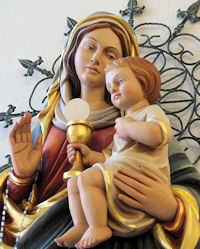The best way for Catholics to mark the Reformation is to celebrate the papacy by
Fr Alexander Lucie-Smithposted Friday, 1 Apr 2016
 The Pope Emeritus prepares to greet Pope Francis during the
The Pope Emeritus prepares to greet Pope Francis during the
opening of the Holy Door of St Peter's Basilica
(CNS photo/Stefano Spaziani, pool)
The splintering of Protestantism is the best advert for a pope ever devisedThe
reminder from the ever excellent Cardinal Müller that the Reformation is nothing to celebrate, while a statement of the obvious – after all, how can one celebrate disunity? – still leaves us with a question: just how are we to mark the
500th anniversary of Martin Luther’s revolt against Church doctrine?Just ignoring it would not be right. The Reformation was a huge event and we are still living with its consequences, no one can deny. Much better that we should mark the anniversary in a way that deepens our understanding of it. Why did it happen? What can we learn from it? And what can we do, five centuries on, to heal the breaches created then?
The usual answer to the first question is that the Reformation came about as a movement of reform, as a specific reaction to the corruption of the Catholic Church. I doubt, though, that any serious historian could assert this today, or find any compelling evidence to back up this myth. If we look at the German lands, there is plenty of evidence that the Catholic Church was in many ways still a vital body. Indeed, the proof of this is that half of Germany did not follow Luther: the Catholic Church still retained much credibility. Again, in England, the advanced decay of the pre-Reformation Church, and in particular its monasteries, is a myth. The Tudor Church boasted men like John Fisher and Thomas More, and its monasteries were seized as part of the biggest landgrab in history, rather than for moral reasons. Many of the monks died for the faith, which is hardly a sign that the monasteries had failed as religious institutions.
So why did the Reformation come about? It was partly a political movement: the German princes and Henry VIII arrogating powers to themselves; a nationalist movement, anti-Roman and anti-Spanish, both in Germany and England; and of course a religious movement too. It has to be admitted that Luther asked questions to which the Catholic answer was judged by many to be no longer adequate. And the chief of these questions was: “How can I be saved?”
All this leads to a huge contemporary problem. How are we to mark the anniversary of the Reformation when the question about salvation is no longer at the forefront of the modern consciousness? As far as I can see, even in the traditional lands of the Reformation, no one is exactly agonising over the question of salvation. Indeed, in hugely advanced societies like Sweden, which the Pope will be visiting to mark the anniversary, the general feeling seems to be that one does not need salvation through Christ or anyone else for that matter. Religious statistics are notoriously unreliable, but it seems pretty obvious that Sweden is
one of the least religious countries on earth. Luther would be horrified!
Given that the “How can I be saved?” question is not the one on everyone’s lips, there is a danger that the Reformation anniversary will turn out to be a celebration of its political aspects. Luther is, let us not forget, a German national hero. As for England, the other day I met an MP (let him be nameless) who told me that in supporting Brexit, he was simply aiming to do what Henry VIII and Cranmer did, taking back sovereignty from a foreign power. Actually, he is right: the Act in Restraint of Appeals, which separated England from Rome, contains the famous line “This England is an Empire”, meaning that England was sovereign and not subject to any other powers such as the papal one. Just as Luther is a hero in Germany, Henry VIII is to many here, still.
What then is to be done? I think the best way to mark the Reformation is to emphasise that the Church can only be universal, that is Catholic, in that Christ only brought one revelation, and only founded one Church. The idea of a national church is completely absurd. Coupled with this there needs to be a strong presupposition in favour of internationalism (which, as my Brexiteer MP and I agreed, was quite in keeping with leaving the EU, as that institution is not to be confused with Europe itself).
Finally, I think we need to make the Reformation anniversary into a celebration of the role and nature of the papacy as the focus of unity and guarantor of doctrinal truth, for the splintering of Protestantism (of which Luther would not have approved, I feel) is the best advert for the papacy ever devised. Instead of asking the question “How can I be saved?” we need to turn our attention to the question “What is the Church?”



